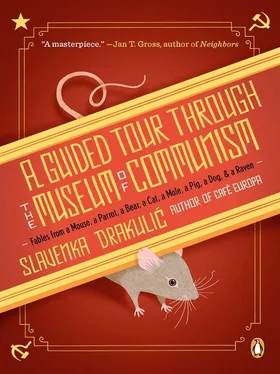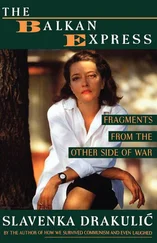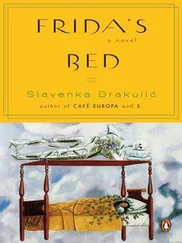“Listen, Gorby,” he told me one evening in that agitated mood that sometimes overcomes him. “People should believe me that there was no other way; I did not have a choice in December 1981. It really was a matter of the lesser evil, as is often the case in politics. You, of all creatures, know how rarely I speak about that part of my life… I do not like to remember those moments—you call it suppression, no? Oh, if only you had been there, in Moscow on that December night when the Soviet comrades summoned me to a meeting of the Politburo, for ‘consultations,’ as they called it. I still remember the tense, nervous atmosphere in the room. Leonid Brezhnev was sitting at the head of a long table with his bulldog face and beady eyes. He was already very ill, but no less dangerous for it. And Andropov was breathing down his neck. These comrades looked to me like a pack of dangerous dogs, ready to bite. Not much was said, but from their looks I understood the precarious situation Poland was in, with the Solidarity movement’s demands undermining the entire Communist system. They were afraid that the ‘Polish pestilence’—as one of them put it—would spread if it was not ‘contained.’ That reminded me of 1968, of the moment when we in Poland were forced to send our soldiers against our brothers in Prague. How I regret that today! And how sadly it ended there, how we crushed Dubček and his reforms!
“It should have been clear to me then what was clear to Brezhnev in 1981: that Communism was not a system that could be reformed, and that any such attempt would only bring it down. Gorbachev did not understand that either, unbelievable as it sounds. When, almost two decades later, it was Gorbachev’s turn to try reform—how did it end? With the collapse of almost the entire Communist world. I admire that man for his brave attempt to do the impossible—but I do not understand why he didn’t learn from the failure of the ‘Prague Spring’ and from martial law in Poland? Was he so naïve? Or just a hard-core believer in Communism, like me?
“Anyhow, in 1981 Brezhnev was not naïve at all. He forced me to act, because he knew what we did not. There was no question of the Soviets leaving us in peace to slowly reform our Communism as we saw fit. They did not want another Aleksander Dubček. As Brezhnev-the-bulldog told me in no uncertain terms in his office before the meeting with the others: ‘How long do you intend to tolerate anarchy? Either you take care of your problems, or else we will.’ His words were not open to interpretation, my friend. He did not suggest that, for example, I should resign if I didn’t curb the protests or something as benign as that. It would have been an easy choice; I would have gladly done it. True, he never said what his threat really meant; he never mentioned the words ‘military interventionʹ—in that my opponents are right. The Soviet threat was never spelled out! However, there was not the slightest doubt as to what Brezhnev and all the rest really had in mind.
“You probably wonder if I was afraid. Later people asked me, did I feel physically threatened. I fought in the Second World War, Gorby. I know what fear is. No, this was not the fear of death that one feels in war. All soldiers feel it; it’s only human. But when you are fighting, there is a certain moment when fear turns into indifference. Or, better said, into a reconciliation with one’s destiny, acceptance of the consequences. You cannot fight and be afraid all the time. Therefore, you have to make peace with yourself—perhaps not consciously. I believe it is the survival instinct that makes us acknowledge death in order to live. What a beautiful contradiction, when you think of it!
“I remember I went to the men’s room. There was a mirror there. I looked at myself. I felt calm, just like in 1943 when I was sure I would be killed by the Germans in a battle. So, then and there, in the toilet of the Kremlin palace, I made my decision: Poland would be saved from invasion! I was ready to sacrifice my reputation rather than the lives of my people. Let me make this clear to you: I was well aware of the price I would personally have to pay for such a decision, and, as my mother would say, I was ready to bear my cross. But back then I thought that one day, when the crisis of Communism was over (imagine how trusting I was!), my people would realize that my decision had been necessary in order to save their lives. Back in the conference room I told our Soviet comrades that they need not worry; we Poles would take care of our ‘problems’ ourselves. I could not, of course, repeat the word ‘pestilence.’ Brezhnev stood up, slapped me on my back, and grinned unpleasantly. That was it.”
This is what the General himself confessed to me. Therefore, the problem of this trial, as I see it now, is that it will be his word against those who say that there was no Soviet invasion planned. Indeed, lately even some documents were found in support of this. But who could have known that then?
To all this I could add a few conclusions about his character: The General is a serious person. You rarely see a photo of him smiling, only in family photos perhaps. Usually he is somber, his dark glasses adding to his gloom, showing that he carries a heavy weight on his shoulders. Although he is not without a sense of humor! He is a man of principles, even if these principles are different from yours or mine. As an illustration, I will only tell you that he did not enter the church at the funeral of his mother, an ardent Catholic. No, not even in plain clothes. He waited in front of the church until the service was over. “ A Communist army general does not go to church under any circumstances! ” he told me later on. Even if you don’t believe this anecdote, I can vouch that for him duty is above all else. This—permit me to say—is not a very catholic value. Besides, he proved to be intelligent and capable of grasping the new situation and adapting to it. A complex personality… Which is precisely my reason for writing this letter, in my capacity as both a specialist in human psychology and his friend. Do I even need to tell you that Napoleon, when I told him about my intention to write this letter, dismissed it sneeringly, calling you “a bloodsucker”? But that is his level, I am afraid.
In spite of his—not my!—low opinion of you, Sir, I would like to trust you. I already said that my name is Gorby, after Gorbachev. I am well aware that you—like many others before you—might be puzzled by my name. The General himself gave it to me, although, considering my female gender, it would have been more appropriate, wouldn’t it, to have named me Raisa, after Gorby’s wife, whom he loved so dearly. It seems like a paradoxical twist that the General (my pet human) should name his pet cat after somebody who dismantled Communism and therefore should be his enemy. But, believe me, he had his reasons. He admired Gorby—almost like Napoleon (the man, not the dog, of course). The mere fact that he named me after Gorby should tell you a lot about the General himself.
The great absurdity of Gorby’s life (not mine!) was that the collapse of Communism was the result of his own attempt to reform it , to perfect it, as he himself said. Isn’t that a sad destiny, to live to see exactly the opposite of what you intended? To have the whole world admire you for something that you did not want to achieve? To see people applaud you for the mistake you made? In hindsight it looks like a comedy, but it is a tragedy! So, they both believed in the possibility of saving Communism , one way or another, and they both ended up losers. Gorby is almost like a character from a comedy of errors. Think about it: The outstanding political change of the twentieth century happened, in fact, by mistake!
Читать дальше












